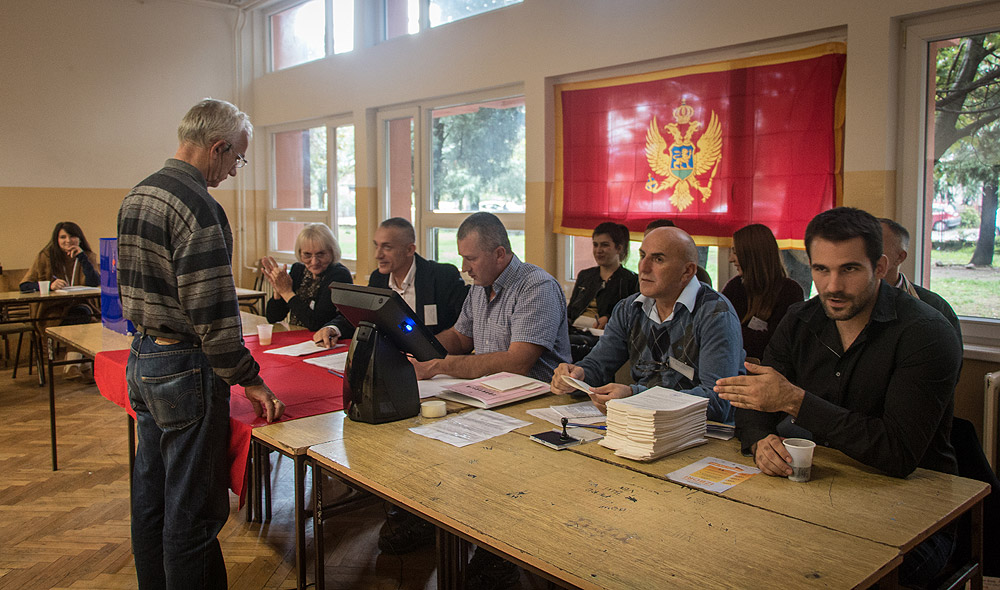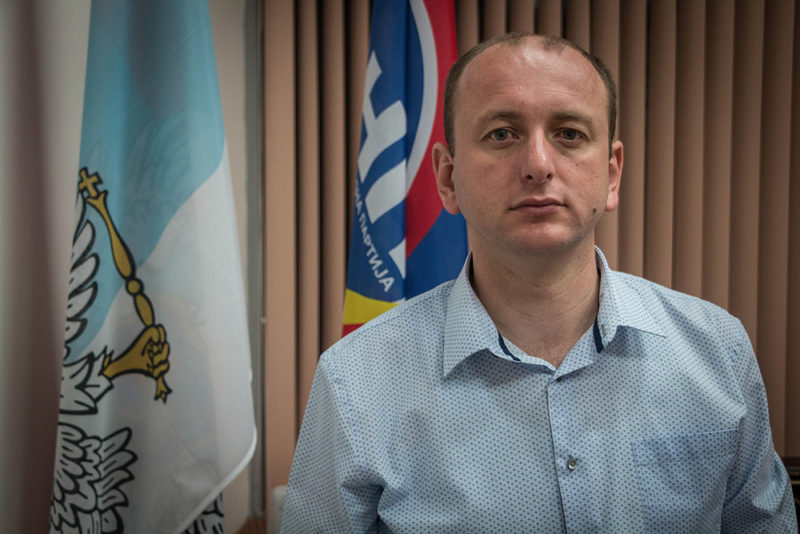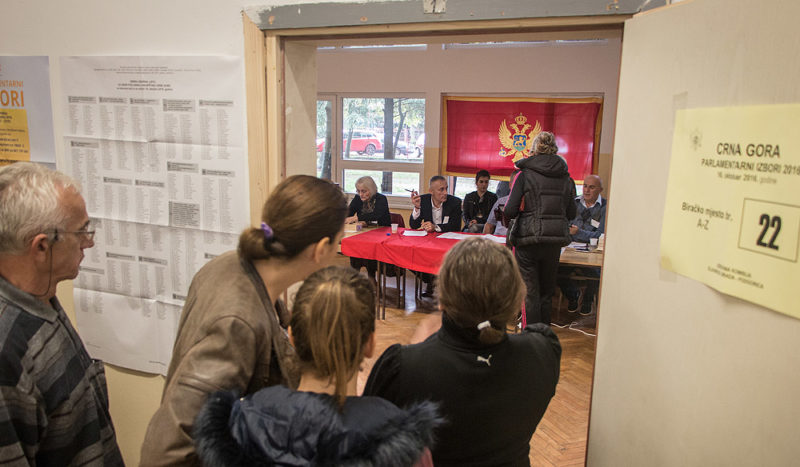 Polling station in the capital Podgorica. According to the opposition, the election was marked by police harassment and widespread fraud. Photo: FWM
Polling station in the capital Podgorica. According to the opposition, the election was marked by police harassment and widespread fraud. Photo: FWM
Montenegro chooses between East and West
Elections in Montenegro October 16 were crucial for the question of whether the country would apply for NATO membership or approaching Russia. The result, however, has been an unclear parliamentary situation in which neither the ruling party nor the fragmented opposition won a majority. The election was also marked by corruption allegations, where expatriates without the right to vote were allowed to do so and where votes even were bought. Free West Media reports from Montenegro.
Published: November 7, 2016, 10:06 pm
The Balkans are torn between East and West, where many governments choose to move closer to NATO, despite a more or less pro-Russian population. On October 16th elections were held in the small state of Montenegro with only 528,817 voters. According to Prime Minister Milo Dukanovic it was a “historic election” in which the people chose between stronger ties to the EU and NATO or to Russia.
An independent survey conducted during May and June this year revealed that 60.1 percent of the electorate would be against NATO membership because of the military alliance’s bombing of Montenegro during the wars in the former Yugoslavia. The Prime Minister, being a strong NATO advocate, was therefore accused of trying to avoid the issue being settled by a referendum.
– Dukanovic is aware of these numbers, and that is why he wants to avoid a referendum. The NATO members know them as well, and therefore want to him to make sure that the resolution is adopted by the Parliament, claims Milan Knezevic, one of the opposition leaders, in talks with Free West Media.
In the elections Milo Dukanovic’s ruling Democratic Socialist Party of Montenegro (DPS) won 36 seats, which was an increase of five seats, but meant that the party still was five seats short of a majority. This despite the fact that DPS was accused of orchestrating distractions such as the arrest and imprisonment of 20 Serbian citizens, accused of attempting sabotage and even terror plots.

Milan Knezevic, one of the leading representatives of the opposition alliance Democratic Front (DF). He is party leader of the Democratic Peoples Party, one of the two main parties within the DF. Photo: FWM
The opposition wants a referendum
Although half of the opposition parties is for a Euro-Atlantic rapprochement and therefore would probably be able to get the upper hand in parliament together with the ruling party, a compromise was reached the day before the election that the issue would be decided by referendum.
Not everyone, however, is confident that the agreement will be honored. Strahinja Bulaic, deputy chairman of the largest opposition party New Serbian Democracy, fears that other parties could agree to a settlement with the Prime Minister if the US embassy were to exert sufficient pressure.
– The US Embassy meddles directly in Montenegro’s internal affairs. This is done personally by their ambassador, and it’s no secret. It is so clear that everyone can see it, he says to Free West Media.
He says that “some secret meetings” took place at the US Embassy between “some opposition parties and coalitions”.
– Consequently, we conclude that the US Embassy controls this issue and that Montenegro’s NATO membership will be determined by a decision in Parliament and not in a referendum, he said.
“Death squads” made to order
The day of the election was turbulent. It began with an unexpectedly high turnout, where the polling stations could boast of long queues. Many felt that the election was important and even voters who would otherwise not usually vote felt motivated to go to the polling stations.
The high turnout appeared to be negative for the ruling DPS, since their electoral base is largely made up of government employees and pensioners, who always participate in force. They vote for the ruling party, partly to preserve the stability of the country, but also fears a decline of the standard of living in case of a transfer of power. The majority of the previously passive citizens who are now mobilized voted for the opposition.
In the midst of this popular enthusiasm, the country was shaken by the news of the arrest of 20 “terrorists from Serbia”, led by gendarmerie commander Branislav Dikic. At lunchtime on the election day it was reported that these would have planned a massacre of civilians, occupy the parliament building, arrest Prime Minister Milo Dukanovic an then proclaim victory for the opposition. Government-controlled media reported “terror export” and “threats of a coup”. Heavy police presence was noted in the streets of Podgorica, which were filled with the sound of sirens and flashing lights.
Critics immediately noted inconsistencies in the reporting. The arrested hardly resembled the description of a “death squad”, and they were brought to the special prosecutor by regular police, rather than by antiterror units, and without handcuffs. Six of them were also released immediately after questioning, despite these serious allegations. The result of this upheaval was, however, that some of the voters chose to be cautious and not to leave their homes. Voter turnout was finally 73 percent, only 3 percent higher than in 2012.
Harassment and vote buying
Our reporter noticed that many did not dare to speak openly about their opinions. On government orders also popular mobile communication features like Viber and Whatsapp were shut down on the day of the election.
The police frisked hundreds of opposition activists and several MPs from the electoral alliance Opposition Democratic Front (DF) were arrested and interrogated. Their headquarters was searched for illegal weapons. DF is a block consisting of several opposition parties.
DF says itself that the crackdown took place because they had exposed electoral fraud in the coastal city of Bar, where opposition activists with hidden microphones had recorded the testimonies of people who had been bribed by the DPS. Ironically, the offices of the two rival parties are located in the same building, almost door to door. On election day DF officials noted a large influx of visitors to the opponents’ offices, and after one of them accidentally went to the DF’s office, it was obvious that people came to get their payment for voting DPS.
Moreover, it appeared that most visitors who were loyal to the ruling party had come from abroad. Many of them are suspected to have even been flown in by charter, as indicated by the surge in flights recorded in Podgorica Airport official documents. According to Montenegrin law, only citizens who have lived in the country during the last two years before the election are allowed to vote.
DF could finally prove that this was the case, by taking advantage of the ignorance of these bribed voters. They pretended to be regular DPS representatives, invited them to their office and got them to talk openly about their accommodation, travel and agreed bribe amounts. 50 cases of such political corruption were documented and the films were submitted to the Montenegrin Prosecutor.
This “Operation Luxembourg”, as the opposition jokingly called the event, were estimated to have created more than a thousand fake voters in Bar alone at a total cost of 310,000 euros. To foreign readers, this method may seem strange and ineffective, but one should keep in mind that Montenegro is a small country and that the DPS only needed 4,400 votes to secure a mandate, which in this case could be decisive.
NATO issue overshadowed
DF is a strong opponent of NATO membership, but when the other opposition parties threatened to leave the cooperation, it agreed to put the issue on back burner. The main message was instead the need to replace Dukanovic. DF’s new slogan “Either him or us” turned the election into a duel against the incumbent Prime Minister. The slogan “Let Montenegro work!” was even more remarkable, as it was obvious that it could not have been invented by a Montenegrin, despite high unemployment. The population began to joke about the slogan, since Montenegrins are not particularly known for their hard work. It would later emerge that the Israeli campaign expert Aron Shaviv actively participated in the design of the DF’s election campaign.
After the elections, however, it was obvious that the fixation on Dukanovic was a mistake, because he will in any case leave the post as Prime Minister.
– Believe me or not, but even if DPS would win, 15 to 20 percent of their voters will oppose the accession of Montenegro to NATO, claims Milan Knezevic in an interview with Free West Media.
NATO a loincloth for corrupt politicians
According to DF leader Andria Mandic, there are two main reasons why the current Prime Minister will try to make the country join NATO against the will of most citizens:
– The first is that Western security services have sufficient evidence of the criminal activity of which the Dukanovic regime has been guilty. They can then blackmail Dukanovic and his entourage, which means that they have to do what they are told. The second reason is that Dukanovic owes money to people in the East, which he wants to avoid paying back by bringing Montenegro towards a conflict with Russia, explains Mandic in an interview with Free West Media.
The West is well aware of Dukanovic’s crimes. In January, a former spokesman for the Pentagon told the Washington Times: “Dukanovic must receive a clear signal: NATO is not a free pass from prison”.
However, all this is still to NATO’s advantage and its representatives are prepared to turn a blind eye to all criminal activity, which once again was confirmed by a press secretary for the alliance, who after the election declared the parliamentary elections “democratic” and said that “NATO looks forward to working with the new government “. And such a government is probably only a matter of time, despite the opposition’s refusal to recognize the election results because of the electoral fraud.
That was recognized even by the pro-government daily Pobyeda, who in a pompous editorial entitled “A great victory for the pro-Western option,” published the day after the election, declared that “The parties that support NATO membership will have 59 percent and 48 seats in Parliament , ensuring that the proposal for accession to the alliance will be adopted”.
All rights reserved. You have permission to quote freely from the articles provided that the source (www.freewestmedia.com) is given. Photos may not be used without our consent.
Consider donating to support our work
Help us to produce more articles like this. FreeWestMedia is depending on donations from our readers to keep going. With your help, we expose the mainstream fake news agenda.
Keep your language polite. Readers from many different countries visit and contribute to Free West Media and we must therefore obey the rules in, for example, Germany. Illegal content will be deleted.
If you have been approved to post comments without preview from FWM, you are responsible for violations of any law. This means that FWM may be forced to cooperate with authorities in a possible crime investigation.
If your comments are subject to preview by FWM, please be patient. We continually review comments but depending on the time of day it can take up to several hours before your comment is reviewed.
We reserve the right to delete comments that are offensive, contain slander or foul language, or are irrelevant to the discussion.

New App Helps Locate Sweden’s Historic Runestones
A new app called Swedish Runestones will help locate historical gems.

Swedish military wants to remilitarize the Åland Islands
The demilitarized autonomy has previously been known as 'the islands of peace.

NOAA Predicts Zero Sunspots for Almost the Whole 2030s
CLIMATEThe United States' government scientific organization, the National Oceanic and Atmospheric Administration (NOAA), predicts zero sunspots from 2031 to 2040. This is an extreme situation that has not occurred in as long as humanity has been counting sunspots, and it leads us into uncharted territory in terms of our solar system. However, this prediction aligns with the warnings of the world-renowned solar researcher Valentina Zharkova for many years, who indicated in 2019 various signs of this catastrophic phenomenon, including the extreme hailstorms we have seen in Europe and the world this summer. The forecast and various observations this year give cause for very significant concern. In this unique analysis, Free West Media explains why.

European Nationalist Parties Forge Cooperation Ahead of EU Elections
EUROPEAN ELECTIONSOn Saturday, August 26, representatives of six European nationalist parties gathered in Budapest. The meeting was initiated by the Hungarian party Mi Hazánk and took place in the national parliament. Representatives of the parties signed a joint declaration that not only reaffirms the parties' friendship but also their unity on a range of complex political issues. A surprisingly clear and radical manifesto was established. The hope is that this cooperation will lead to success in the EU elections and eventually result in the formation of a group in the European Parliament. For Swedish nationalism, this meeting marks a success as Sweden, for the first time, has a party represented in a leading nationalist cooperation in Europe. Free West Media was present at this historic event.

Turkey Believes Sweden Hasn’t Done Enough
Sweden will have to wait a bit longer for NATO membership, according to Turkey's Justice Minister Jilmaz Tunc. First, Sweden must extradite the "terrorists" Turkey wants and stop the desecration of the Quran.

Swedish Weapon Takes Down Russia’s Best Attack Helicopter
The Russian attack helicopter Ka-52 is considered one of the world's best and has struck fear in Ukraine, where it has hunted down tanks and other armored vehicles, often beyond the range of many light anti-aircraft systems. However, it has met its match in the Swedish air defense missile system RBS 70, which has quickly led to significant losses for the Russian helicopter forces.

The Sun Drives Earth’s Climate, Not Carbon Dioxide
Top Researchers Push Back Against Climate Lies."The correlation is as clear as day," explained the Israeli astrophysicist Nir Shaviv, who was hailed by the establishment, before his interview with Forbes was hastily deleted. What he says contradicts the climate narrative, which points to humans as responsible for Earth's climate. Shaviv firmly asserts that it is the sun that controls the climate, something that can be scientifically proven in many ways. Contrary to the popular belief, the sun's influence on Earth has, in recent years, caused unusually cold and rainy weather, a trend that solar researchers warn will worsen significantly in the coming decades. The sun has exhibited an unusually low activity since 2016, during Solar Cycle 24, which was the weakest in a century.

Strong Confidence in German AfD
Alternative for Germany (AfD) held a party conference on July 29-30 to select candidates for the upcoming EU election next year. EU Parliament member Maximilian Krah, belonging to the party's more radical, ethnonationalist faction, was appointed as the top candidate. The party's two spokespersons delivered powerful speeches criticizing the EU's failed migration policy and trade sanctions that isolate Europe and Germany from the rest of the world. They argued that it's time for the EU to return a significant portion of its power to national parliaments. However, they have dropped the demand for Germany to exit the EU.

The Establishment Wants to Ban Germany’s Second Largest Party – for the Sake of Democracy
The rising popularity of AfD has raised strong concerns within the establishment. Despite lies and demonization in the media and isolation from the overall political establishment, the party continues to grow. Certain representatives of the party are accused of becoming increasingly "extreme," and in an unusual move, the influential weekly newspaper Der Spiegel demanded that AfD be "banned."

Dutch FvD break through the media blockade
What is happening in the Netherlands? It is often difficult to follow events in other countries, especially when distorted by system media. We give Forum for Democracy (FvD) the opportunity to speak out on the political situation in the Netherlands and the staunch resistance they face in trying to save the country.




No comments.
By submitting a comment you grant Free West Media a perpetual license to reproduce your words and name/web site in attribution. Inappropriate and irrelevant comments will be removed at an admin’s discretion. Your email is used for verification purposes only, it will never be shared.